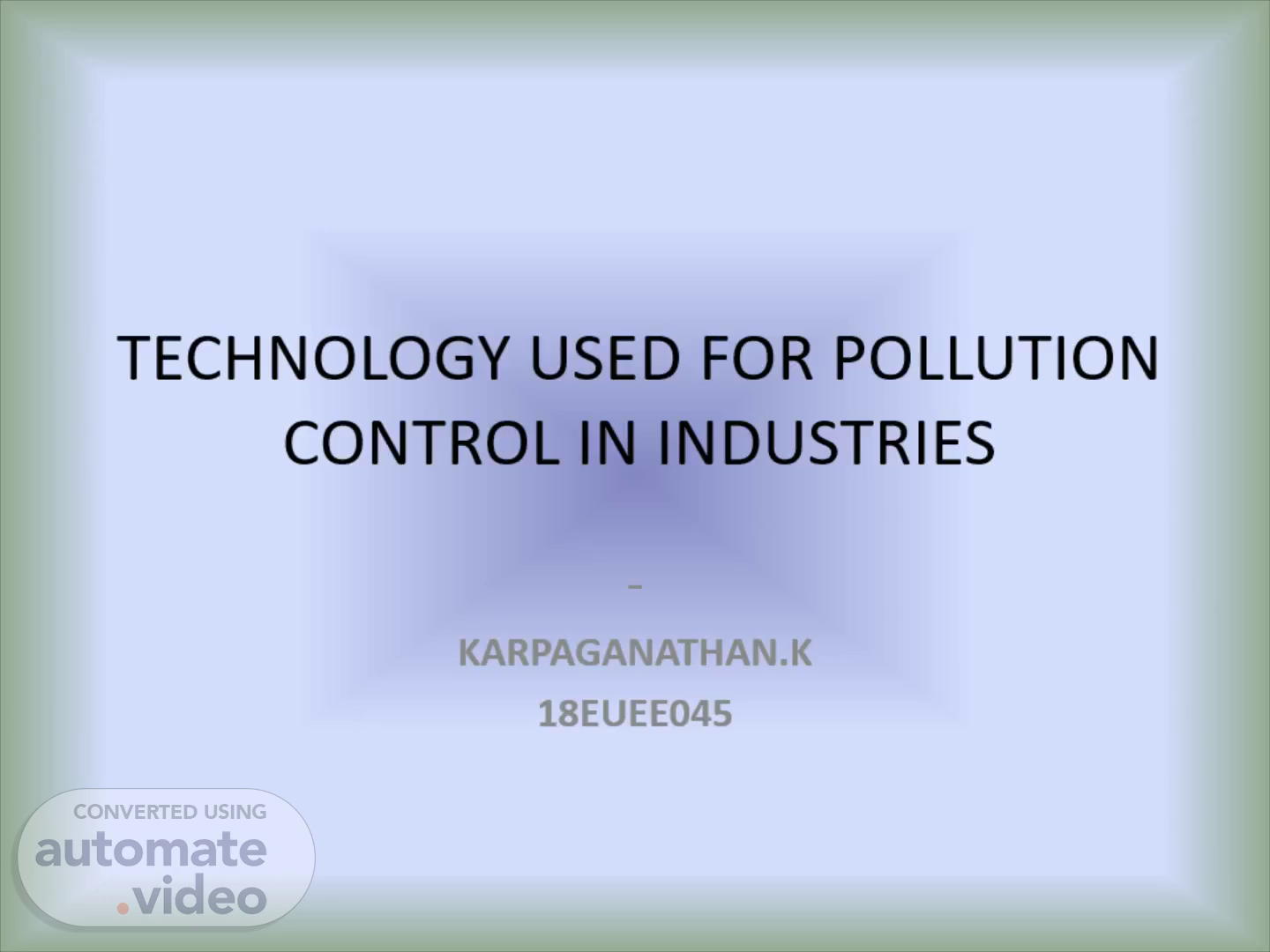
TECHNOLOGY USED FOR POLLUTION CONTROL IN INDUSTRIES
Scene 1 (0s)
TECHNOLOGY USED FOR POLLUTION CONTROL IN INDUSTRIES.
Scene 2 (7s)
Industrial Pollution. Industrial pollution is the pollution which can be directly linked with industry . This form of pollution is one of the leading causes of pollution worldwide. ... Industrial pollution can also impact air quality, and it can enter the soil, causing widespread environmental problems..
Scene 3 (23s)
Effects of Industrial Pollution on Our Environment.
Scene 4 (36s)
WATER POLLUTION. The effects of industrial pollution are far-reaching and liable to affect the ecosystem for many years to come. Most industries require large amounts of water for their work. When involved in a series of processes, the water comes into contact with heavy metals, harmful chemicals, radioactive waste , and even organic sludge..
Scene 5 (54s)
SOIL POLLUTION. Soil pollution is creating problems in agriculture and destroying local vegetation. It also causes chronic health issues to the people that come in contact with such soil on a daily basis..
Scene 6 (1m 6s)
AIR POLLUTION. Air pollution has led to a steep increase in various illnesses, and it continues to affect us on a daily basis. With so many small, mid and large scale industries coming up, air pollution has taken a toll on the health of the people and the environment..
Scene 7 (1m 22s)
WILDLIFE EXTINCTION. By and large, the issue of industrial pollution shows us that it causes natural rhythms and patterns to fail, meaning that the wildlife is getting affected in a severe manner. Habitats are being lost, species are becoming extinct, and it is harder for the environment to recover from each natural disaster ..
Scene 8 (1m 40s)
GLOBAL WARMING. With the rise in industrial pollution, global warming has been increasing at a steady pace. Smoke and greenhouse gases are being released by industries into the air, which causes an increase in global warming. Melting of glaciers , extinction of polar bears, floods, tsunamis, hurricanes are few of the effects of global warming ..
Scene 9 (1m 58s)
BIODIVERSITY LOSS. Industrial pollution continues to cause significant damage to the earth and all of its inhabitants due to chemical wastes, pesticides, radioactive materials etc. It affects wildlife and ecosystems and disrupts natural habitats. Animals are becoming extinct, and habitats are being destroyed..
Scene 10 (2m 14s)
ATMOSPHERIC DEPOSITION. Industrial effluents are commonly discharged to surface water drainage systems after clarification in tailing ponds. Recent investigations have disclosed very high concentrations of Cd in the overbank and bottom sediments of the rivers..
Scene 11 (2m 27s)
Ways to Control or Reduce Industrial Pollution. The issue of industrial pollution is critical to every nation on the planet. With the increase of the harmful effects of industrial pollution, there are many agencies and individuals who are working to reduce carbon footprints and live and work in an eco-friendly way..
Scene 12 (2m 44s)
SOURCE CONTROL. Adopting new technology, efficient training of employees for safe use and development of better technology for disposal of waste , and being more conscientious about the use of raw materials can help control industrial pollution at the source..
Scene 13 (2m 59s)
RECYCLING. Recycling as much polluted water in the industries as possible by increased recycling efforts to reduce industrial pollution..
Scene 14 (3m 11s)
CLEANING OF RESOURCES. Organic methods should be adopted to clean the water and soil, such as using microbes that use heavy metals and waste as feed naturally. Cooling rooms or bins need to be developed that allow industries to recycle the water they need instead of pushing it back into the natural water source it came from..
Scene 15 (3m 29s)
Industry Site Selection. Consideration of location of the sites and the potential impact on the surrounding environment can help reduce harmful consequences ..
Scene 16 (3m 44s)
Proper Treatment of Industrial Waste. By developing and implementing adequate treatment facilities for handling industrial waste and proper habits can reduce pollution..
Scene 17 (3m 55s)
Rebuilding Habitats and Afforestation. Rebuilding habitats by planting more trees and plants can help give wildlife back their homes, and the trees can help purify the air with enough oxygen, and act as a buffer against the environment..
Scene 18 (4m 9s)
Stricter Laws and Enforcement. The Environmental Protection Agency (EPA) works to correct the damage from industrial pollution. There should be more stringent rules to take action against the companies who do not follow proper protocol and more significant rewards for the companies who operate properly. It requires creating policies that prevent misuse of land..
Scene 19 (4m 26s)
Regular Environmental Impact Assessments. Being a responsible company or industry should require regular environmental impact assessments that are reported for evaluation. If there are harmful impacts discovered during the review, necessary actions to correct the negative consequences should be developed and enforced ..
Scene 20 (4m 41s)
THANK YOU.